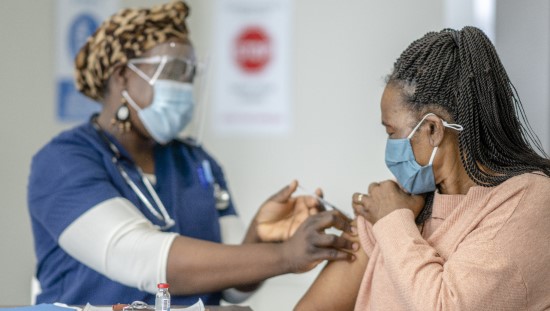COVID
How to get the latest vaccine
Learn more

Every year, millions of people get sick with a contagious respiratory virus, like the flu, COVID-19 or RSV.
As the number of cases increase in the community, especially during the fall and winter months, it gets harder to avoid being exposed to these viruses. One of your best defenses against getting sick is a vaccine.
Learn more about who should get vaccinated and where you can find vaccines.
An updated COVID-19 vaccine (2024-2025 formula) was released on August 22, 2024, to protect against the latest strains.
Adults and children ages 6 months and older are eligible for this vaccine.
October is a good time to get the COVID-19 vaccine. You can get it anytime as long as it’s been 60 days (2 months) from your previous COVID vaccine or booster.
If you recently had COVID-19, you might want to wait for about 3 months before getting the vaccine. Reinfection is typically unlikely in the first months, per the CDC.
If you have never had a COVID-19 vaccine, you can start with the shot that's available now. Adults and children who are getting vaccinated for the first time might have to get more than one dose. You can check the CDC site for details.
It takes a few weeks after your shot to boost immunity. Maximum protection is usually achieved in the first three months after vaccination.
You can go to vaccines.gov to search by zip code for where to get a COVID-19 vaccine locally. Here are places that typically offer the COVID-19 vaccine:
The Centers for Disease Control and Prevention (CDC) estimates that a flu shot can reduce the risk of getting sick with the flu by 40%-60%. You need a flu shot every year to stay protected.
Adults and children ages 6 months and older are eligible for the flu vaccine.
September or October is a great time to get your flu shot every year. That way you'll be protected from December through February, when cases are at their highest. However, it is not too late to get a vaccine after flu season is under way.
The flu vaccine's protection is effective about 2 weeks after a flu shot. You are protected for months, and then protection declines over time.
You can go to vaccines.gov to search by zip code for locations that offer flu vaccines. There are a few options for where to get your flu shot:
The RSV (respiratory syncytial virus) vaccines were new in 2023. RSV causes cold-like symptoms in many people, but can be serious for infants and older adults. Like the flu, RSV usually starts in the fall and peaks in winter (although it does vary in different parts of the country).
According to the CDC:
September or October is a good time to get the RSV vaccine. RSV season is from late fall through winter, but can extend into spring. Cases tend to be at their highest around December.
You can visit the CDC's RSV page to get the latest information on this new vaccine. Here are places to check for the RSV vaccine near you:
You can take everyday prevention measures to help reduce the spread of respiratory illnesses:
Wear a mask when sick to prevent spreading infection to others, or when around others who are sick to avoid getting infected.
Updated October 2, 2024